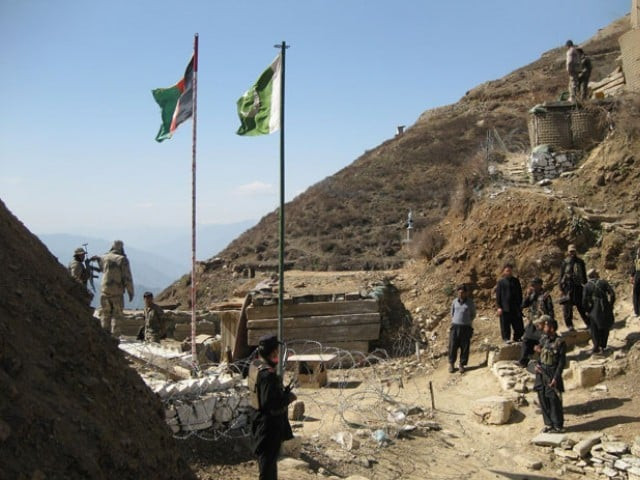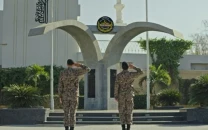Afghanistan cracks down on elements targeting Pakistan
Islamabad feels change in Kabul's attitude

The interim Afghan government has taken a series of steps, including for the first time cracking down on elements that encouraged Afghan nationals to launch cross-border terrorist attacks – a significant development that has led to deeper engagement between Islamabad and Kabul.
While much of the public focus over the past month remained on tensions between Pakistan and India, Islamabad and Kabul quietly worked to reset their troubled relationship during the same period.
At the heart of the strained ties is the presence of the banned Tehreek-e-Taliban Pakistan (TTP) and other groups posing a threat to Pakistan.
For long, Pakistan failed to convince the Afghan Taliban to take decisive steps against terrorist groups operating from Afghan soil.
However, for the first time, Pakistan observed a change in Kabul's approach when a Pakistani delegation, led by Special Envoy on Afghanistan Ambassador Muhammad Sadiq Khan, visited the Afghan capital in the third week of March and was briefed about steps Kabul had taken to stop cross-border terrorist attacks.
A source privy to the closed-door discussions told The Express Tribune that for the first time since the Taliban took over in August 2021, Pakistan felt the interim government was serious about addressing its concerns.
The source said the Pakistani delegation, which included military and intelligence officials, was convinced that this time the Taliban side meant business.
Details were not revealed at the time, but sources have now confirmed that the Afghan Taliban began a crackdown on their nationals who had either joined the TTP or were planning to be part of the group.
Sources said many Afghans, particularly those recruiting fellow nationals for the TTP, were jailed and proceeded against.
In recent months, Afghan nationals were increasingly found involved in the TTP-sponsored terrorist attacks in Pakistan, something that rang alarm bells in Islamabad.
Pakistan strongly protested and provided evidence to the Taliban government about the involvement of Afghan nationals in terror attacks. Sources said finally the Afghan Taliban swung into action, which not only led to a significant drop in suicide attacks in K-P but also helped improve ties between Pakistan and Afghanistan.
All those developments paved the way for Deputy Prime Minister Ishaq Dar to undertake a visit to Kabul on 19 April. This was the first visit by any Pakistani foreign minister to the Afghan capital in three years.
Both sides during the visit had agreed on a number of steps, including a fresh Kabul assurance not to allow Afghan soil to be used against Pakistan. In return, Pakistan removed certain restrictions on Afghan trade, including doing away with the condition of bank guarantees for Afghan importers.
The Taliban government won Pakistan's confidence after it apprehended certain Afghan nationals who facilitated over 70 terrorists, mostly Afghan, trying to infiltrate into Pakistan soon after the Pahalgam attack.
However, Pakistan's timely action neutralised all of them at the border near North Waziristan in the biggest encounter with terrorists in a single day since Pakistan's war on terror after the 9/11 attacks.
However, sources said Pakistan believes that the Afghan Taliban needed to take irreversible steps. "It is a positive start. We hope they (Taliban government) will continue on this path," said an official while requesting anonymity.
It is believed that China, from behind the scenes, nudged both sides to stay engaged and resolve issues through dialogue.
On May 21, Chinese Foreign Minister Wang Yi hosted a previously unscheduled meeting of Pakistan and Afghanistan Foreign Ministers in Beijing.
After the informal trilateral meeting, the Chinese Foreign Ministry announced that Pakistan and Afghanistan expressed their willingness to upgrade their ties and, in principle, agreed to exchange ambassadors.
A Pakistani official confirmed the decision and said the process would take some time since certain formalities needed to be fulfilled.
The official defended Pakistan's move, saying many regional countries were contemplating upgrading ties with the Taliban government.
China was the first country to send a full-time ambassador to Kabul and accept a full-time Taliban envoy in Beijing.
It is believed that Russia and Turkey are also considering appointing full-time ambassadors in Kabul.
The official said that despite many reservations, Pakistan had few options but to pursue a more pragmatic approach.
The recent military escalation with India is also believed to have played a role in shaping Pakistan's policy towards Afghanistan.
Given that tension with India is not going to ease anytime soon, Pakistan wants to ensure that there is no trouble at the western border.
India is also trying to reach out to the Afghan Taliban, who were once seen as Pakistan's proxy in New Delhi. Indian External Affairs Minister S Jaishankar spoke to his Afghan counterpart recently, departing from New Delhi's over two-decade-long policy of not engaging with the Taliban.
Observers believe that the recent Beijing trilateral meeting was China's message to India. At the same time, Beijing conveyed to the Taliban government that Afghanistan's interests were better served if they aligned themselves with China and Pakistan.





















COMMENTS
Comments are moderated and generally will be posted if they are on-topic and not abusive.
For more information, please see our Comments FAQ